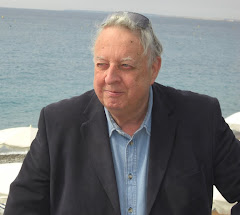Monday 27 August 2012
Guillaume Lekeu
Saturday 25 August 2012
Xiayin Wang in Rachmaninov
My kind of pianist. I like pianists called “Wang” and must investigate Xiayin further. And Rachmaninov's music is growing on me apace. Like all the turn of the century composers, he had a bad press with many of the critics, the avant-garde and the so-called opinion makers. But a hundred years of so on, Sergei Vasilievich's music has survived and enjoys constant and widespread popularity with both performers and listeners. Including me.
Joseph Szigeti
Monday 20 August 2012
Gillian Welch
Leonidas Kavakos
Sunday 19 August 2012
Gardiner, and Kulenkampff
Back to Bach's St John Passion. After my big disappointment with Budget Bach Jos van Veldhoven, I went out and bought John Eliot Gardiner (2003 recording, Solo Dei Gloria). Much more my cup of tea. Since the 1980s, Gardiner appears to have mellowed, and a degree of mellowness never hurts Bach. Good soloists (a little recessed in the recording) and an excellent choir, unlike van Veldhoven and his puny line-up. Not a counter tenor nor a male alto in sight, thank goodness. The Jewish crowd sounds suitably vicious in Gardiner's -- and Bach's -- hands. I must dig out the 1987 version with Sigiswald Kuijken that I have lurking on a shelf somewhere.
Violin listening has featured Georg Kulenkampff. My kind of violinist. In Central Europe during that era, there was none of the pressure to play faster and louder than anyone else, and fellow violinists were colleagues rather than overt competitors. Things changed after 1945, but I really enjoyed and appreciated listening to Kulenkampff just playing the music. The Beethoven and Spohr No.8 violin concertos are particularly pleasing; there is a calm and naturalness about the playing that is good to listen to. Strange that, in the Beethoven violin concerto in particular, my desert island choices out of the hundreds of versions recorded would be – in random order – Kulenkampff, Röhn and Busch.
Saturday 4 August 2012
Back to Diana Damrau, and Franz Liszt
I did well to keep this CD in my “near at hand” file. Is it Liszt that so appeals to me? A bit unlikely, given my track record with Franz Liszt. Or Diana Damrau? I suspect it is the combination of this singer, in this music (with Helmut Deutsch as the perfectly balanced piano partner). In any case; the CD left me with a warm feeling and goes back on the “keep near at hand” file.
Wednesday 1 August 2012
Michael Rabin
What a fine violin concerto Alexander Glazunov wrote; a pity he didn't write more. I listened to the recordings in Testament transfers, kindly donated to me by Lee. They are an improvement on the original EMI-Capitol CD transfers.
Bach's St. John Passion
A glance at almost any Bach score will tell you that his is rich music. Bach liked many notes, and many layers of music and counterpoint. A Bach score is visibly very different and more complex compared with those by his contemporaries such as Handel or Vivaldi. It is therefore logical to imagine that, in his head as he wrote his major concertante works, Bach heard a rich sound. The St Matthew and St John Passions, as well as the Mass in B minor, need gravitas and an impressive depth of sound. A grave disadvantage of the current fad for “Budget Bach” is that in works such as the Passions, a handful of players just cannot sound rich and impressive. The Veldhoven performance seems to boast less than 20 participants in all, including “chorus”, instrumentalists, soloists and conductor. It all sounds too light-weight and super-economy. Poor old Bach; after suffering for decades with giant choirs and inflated orchestras, he now has to suffer from an augmented string quartet and an omnipresent plucking theorbo that at times threatens to dominate the instrumental line. Bach's Jews in their dialogue with Pontius Pilate in the St John Passion are audibly a nastier lot than the Jews in the St Matthew; here, alas, the jaunty light-weight chorus makes the Jews sound a jolly group of locals. The “orchestra” -- what there is of it --- plays discreetly and gives the impression of being a coven of musicologists trying to re-create 1726, or whenever.
Let us hope that the current fad for Budget Bach will run its course and we will eventually hear performances that are worthy of the character of the music. The vibrato-less singers who were all the rage in the 1980s and 90s seem to have died a welcome death, so there is hope for change over the decades to come. Most critics – with the honourable exception of some who write in the American Record Guide – go along with the fashion of the day. But critics die off and are re-cycled.
Subscribe to:
Posts (Atom)
